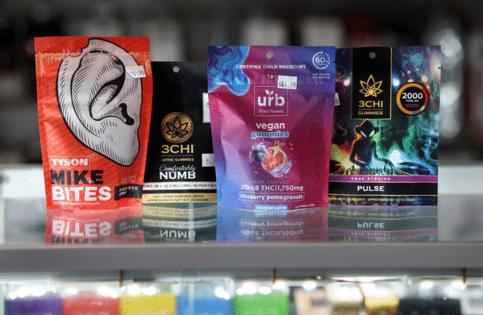Chicago Mayor Brandon Johnson tries to beat state to taxing hemp with plan that adds age limit
Published in News & Features
CHICAGO — Mayor Brandon Johnson is pushing a plan to tax and regulate hemp products that can get people high, which would outlaw sales to those under 21 but forgo testing requirements the administration previously backed.
Johnson’s effort to regulate the marijuana-like products for sale in stores around Chicago would be highlighted by a $2-per-item tax that his administration says will bring in $10 million to help balance the city’s 2026 budget.
That levy would come with a host of new regulations and fees for sellers of the smokable flower and edibles, which exist in a legal gray area. The rules would mark a decisive step by Johnson’s administration in a yearslong regulate-and-tax effort that has pitted the city against the state.
Among them, the new standards would ban hemp products with packaging made “to resemble a branded candy, cookie, chip or other snack food,” an effort to address concerns that hemp manufacturers have been attempting to market their products toward children.
But the management ordinance Johnson’s team shared this week with aldermen who will vote on his plan doesn’t identify specific contaminants the city would ban.
“We’re not giving up on regulation,” Johnson told the Tribune in an interview Tuesday. “In fact, our proposal actually is to make sure, on the front end, that there are stricter regulations.”
Johnson argued that Chicago “did not get its fair share” of revenue when the state legalized the sale of marijuana in 2019. This time, the mayor, who has aired his frustrated belief that Gov. JB Pritzker has repeatedly boxed him out of securing new tax revenue, is trying to beat Springfield to the punch.
“I don’t want what happened to the city of Chicago during the cannabis debate to happen around hemp,” Johnson said.
Efforts to legalize hemp have lingered in the City Council for over a year, led by Johnson’s pick to steer discussions on revenue-generating policies among aldermen, Ald. William Hall, 6th.
Hall attempted to pass hemp regulation in the 2025 city budget, an effort that gained little momentum. But weeks later Johnson helped kill a competing effort in the Illinois House to strongly regulate hemp sales.
Shortly after that, Johnson’s Department of Health commissioner, Dr. Olusimbo Ige, told aldermen the city should take the unprecedented step of adding hemp rules to mirror regulations on marijuana and alcohol.
State lawmakers again failed to pass hemp regulation during their spring session. Aldermen have failed to reach agreement too, though several hemp opponents on the council have meanwhile banned the sales in their wards.
Despite their inaction, City Hall and Springfield share a belief that the generally unregulated products should face some level of restriction. But discussions have been complicated over disagreement on who should get the revenue from the currently low-taxed products and dueling lobbying efforts from hemp sellers who want to stay in business and marijuana companies that argue the less-regulated hemp products take an unfair slice from their sales.
Johnson’s plan would require sellers to furnish samples for CDPH officials when requested. The department would test to make sure the products do not contain more than .3% delta-9 THC, the main intoxicating compound in cannabis.
The rules also bans “toxic chemicals or organisms of public health concern as determined” by CDPH, but does not say what those toxic add-ins would be.
The absent list of contaminants is a notable omission: Ige warned aldermen of the danger or contaminants in hemp products, as have the council’s hemp opponents.
Cannabis products face stricter state rules, which require each batch be tested for over two dozen specific contaminant thresholds that must not be exceeded.
Johnson’s plan would require businesses selling hemp to acquire a $1,750 license. In addition to banning sales to people younger than 21 years old, the measure would require hemp-selling stores to be 100 feet from child care facilities and 500 feet from schools.
____
©2025 Chicago Tribune. Visit at chicagotribune.com. Distributed by Tribune Content Agency, LLC.







Comments